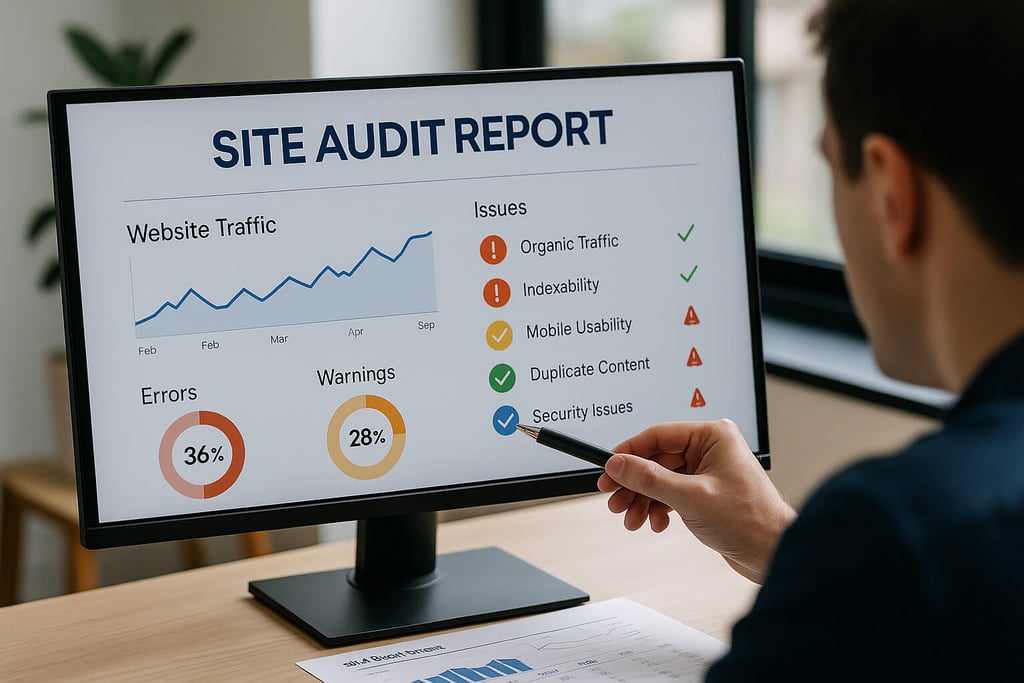SEOJet Flight Blog
SEO Audit: Does Your Website Need One?
SEO Audit: Does Your Website Need One? Discover if an SEO audit is important for your website performance. Uncover issues impacting ranking & organic traffic.
SEO STRATEGY
Ardene Stoneman
5/2/20256 min read


Why Every Website Needs an SEO Audit
If you’re serious about improving how your website performs online, an SEO audit isn’t optional.
It's essential. An audit reveals the real issues holding back your search engine rankings, traffic, and conversions.
Whether you’re managing SEO yourself or using an agency, this guide explains why a proper SEO audit is worth your time and what it should include.
You’ll learn how to identify what’s working, what’s broken, and what your website needs to stay competitive.
If your site isn’t pulling in the results it should, this article will show you why an audit will help.
SEO Audit Guide Outline
What is an SEO Audit and Why Does It Matter?
What Can an Audit Uncover on Your Website?
Benefits of an SEO Audit Beyond Ranking
How On-Page SEO Issues Affect Performance
What Technical SEO Problems Should You Watch For?
Are Your Keywords Still Relevant?
Backlinks and Off-Page SEO - Are You Falling Behind?
Is Your Website Performance Costing You Traffic?
What Makes a Good SEO Audit Checklist?
Should You Hire an SEO Agency or Do It Yourself?
Using SEO Tools Like Google Search Console and Ahrefs
How Often Should You Perform an SEO Audit?
What Does a Professional SEO Audit Report Look Like?
1. What is an SEO Audit and Why Does It Matter?
An SEO audit is a full analysis of a website’s SEO from both a technical and content perspective.
The goal of any audit is to find what’s affecting your site’s visibility on search engines and identify practical actions to fix it.
It looks at everything from your keywords and on-page SEO to technical SEO issues and backlinks. A thorough SEO audit is the foundation of any effective SEO strategy.
Why does this matter? Because without a clear view of how your site is performing, you’re guessing. And guesswork doesn’t improve rankings or website traffic.
2. What Can an Audit Uncover on Your Website?
A proper audit will help uncover issues that most business owners and even developers miss. These might include:
Broken links dragging down your rankings
Duplicate meta descriptions confusing search engines
Pages that load too slowly on mobile
Keyword cannibalisation harming your SEO performance
Even a basic SEO audit can reveal serious problems affecting your site’s usability and performance.
From a search engine perspective, fixing these issues can mean the difference between page one and page five.
3. Benefits of an SEO Audit Beyond Ranking
It’s not all about rankings. An audit can improve the overall user experience too. Here are a few key benefits of an SEO audit:
Better usability for your site visitors
Reduced bounce rate by fixing confusing or slow pages
A clear audit report to guide your next steps
Improved internal links and structure
Data-backed decisions for future SEO strategies
An audit can provide more value than just a list of fixes. It can reshape how you think about your entire website.
4. How On-Page SEO Issues Affect Performance
On-page SEO includes anything that affects how a single page performs on the search engine results pages. This includes:
Title tags and meta descriptions
Keyword placement
Content quality and relevance
Internal linking
Even if your content is excellent, poor on-page SEO will limit its reach. You need to make sure each page is fully optimised for both users and search engines.
The right keywords in the right places make all the difference. But it’s not just about stuffing them in - it’s about context, clarity, and structure.
5. What Technical SEO Problems Should You Watch For?
Technical SEO is often overlooked because it’s not as visible, but it’s just as important. Here are common technical SEO issues:
Slow page load time or poor page speed
Core Web Vitals not being met
Pages blocked by robots.txt
Crawl errors not fixed in Google Search Console
Performing an audit helps spot these problems before they affect rankings. A technical audit can also reveal structural issues that prevent pages from being indexed properly.
Tools like Google Search Console and SEO software can help you stay on top of this. But you need to know what to look for - and what to fix first.
6. Are Your Keywords Still Relevant?
Your keyword strategy might have worked two years ago. But search habits change. Current SEO trends suggest that search intent is now more important than exact-match phrases.
That’s why your audit should check:
Which keywords are still driving traffic
Which ones are outdated or underperforming
How your keywords align with user intent
Using an SEO audit to review your keyword strategy ensures you’re not wasting time creating content that no one is searching for.
7. Backlinks and Off-Page SEO - Are You Falling Behind?
Backlinks remain one of the most powerful signals for search engines. But poor-quality links can hurt more than help.
Off-page SEO, including backlink analysis, should be part of any website audit. Key checks include:
Number of quality backlinks
Anchor text distribution
Toxic or spammy backlinks
Using tools like Ahrefs can help you spot trends in your backlink profile. If your competitors are building strong links and you’re not, your rankings will suffer.
8. Is Your Website Performance Costing You Traffic?
Website performance matters - not just for users but for SEO rankings too.
An SEO audit should include:
Page load time testing
Page speed analysis across devices
Reviewing hosting and code efficiency
If your site is slow, people won’t stick around. And Google notices. Website performance affects everything from bounce rate to crawl budget, so don’t ignore it.
Even simple fixes like compressing images or enabling browser caching can make a big difference.
9. What Makes a Good SEO Audit Checklist?
A proper SEO audit checklist should cover the basics but also go deep where needed. Here’s a quick breakdown of what to include:
On-page checks: Titles, headings, meta descriptions
Technical SEO: Core Web Vitals, robots.txt, XML sitemaps
Keyword analysis: Current SEO terms and trends
Backlink profile: Quality, quantity, and risks
Site structure: Navigation, internal links, broken links
Usability and user experience across devices
Using an SEO audit checklist ensures consistency, especially if you run audits regularly. It also helps your SEO team prioritise fixes.
10. Should You Hire an SEO Agency or Do It Yourself?
If your site is small and you’re confident with tools like Google Search Console and basic SEO practices, a DIY approach might be enough.
But for most businesses, hiring a Local SEO agency makes sense. Here’s why:
They can perform an in-depth audit faster
You get a detailed audit report, not just raw data
Recommendations are based on proven SEO strategies
They can fix what they find
Whether you choose to handle it yourself or use seo auditing services, the important thing is that audits are essential and should be regular.
11. Using SEO Tools Like Google Search Console and Ahrefs
There’s no shortage of SEO tools, but the key is knowing how to use them.
Some essentials:
Google Search Console: Crucial for spotting crawl errors, indexing issues, and keyword performance
Ahrefs: Great for backlink analysis, SEO score tracking, and content gaps
SOEJet: Offers a FREE complete website SEO audit with JETScan
SEO software: Tools like Screaming Frog or Sitebulb offer deep technical audits
Combining these tools gives you the full picture. But remember, tools show problems - they don’t fix them.
12. How Often Should You Perform an SEO Audit?
If your website is actively generating traffic or sales, you need to stay on top of changes.
Here’s a general rule:
Perform a full site audit at least twice a year
Run lighter SEO audits quarterly
Re-audit after major website changes or SEO campaigns
Regular audits help keep your site aligned with current SEO trends and algorithm changes. SEO audits should be conducted before you notice traffic drop-offs, not after.
13. What Does a Professional SEO Audit Report Look Like?
An audit report shouldn’t be a wall of technical jargon.
It should include:
Clear summaries of each audit area
Screenshots and data from tools like Google Search Console
Priority levels for each fix
Links to resources or explanations
A good audit report makes it easy for your SEO team to take action. It also shows progress over time, which helps when you're reporting to decision-makers.
Summary: What To Remember About SEO Audits
SEO audits are important if you want better rankings and more organic traffic
A full audit includes on-page SEO, technical SEO, backlinks, and usability
Website performance, page load, and mobile speed matter more than ever
Using an SEO audit checklist helps you stay consistent and organised
Tools like Google Search Console and Ahrefs are essential, but they’re not the solution alone
Whether you go DIY or hire an SEO agency, regular audits will improve your site’s performance
Need help with an SEO audit that actually makes a difference?
At SEOJet, we cut through the noise. Straightforward audits that show you what’s wrong, what’s working, and how to fix it. If your website needs a fresh SEO perspective, we’re here to help.
Get in touch with SEOJet today and book your FREE SEO site audit.
Services
Contact Us
Newsletter Signup
sales@seojet.co.uk
01934 289 404
© 2025. All rights reserved.


Locations
Weston-super-Mare
Somerset
Bristol
9am - 6pm, Monday to Friday
Suite 2, Unit 7, 12 Beaufigter Rd, Weston-super-Mare, BS24 8EE
